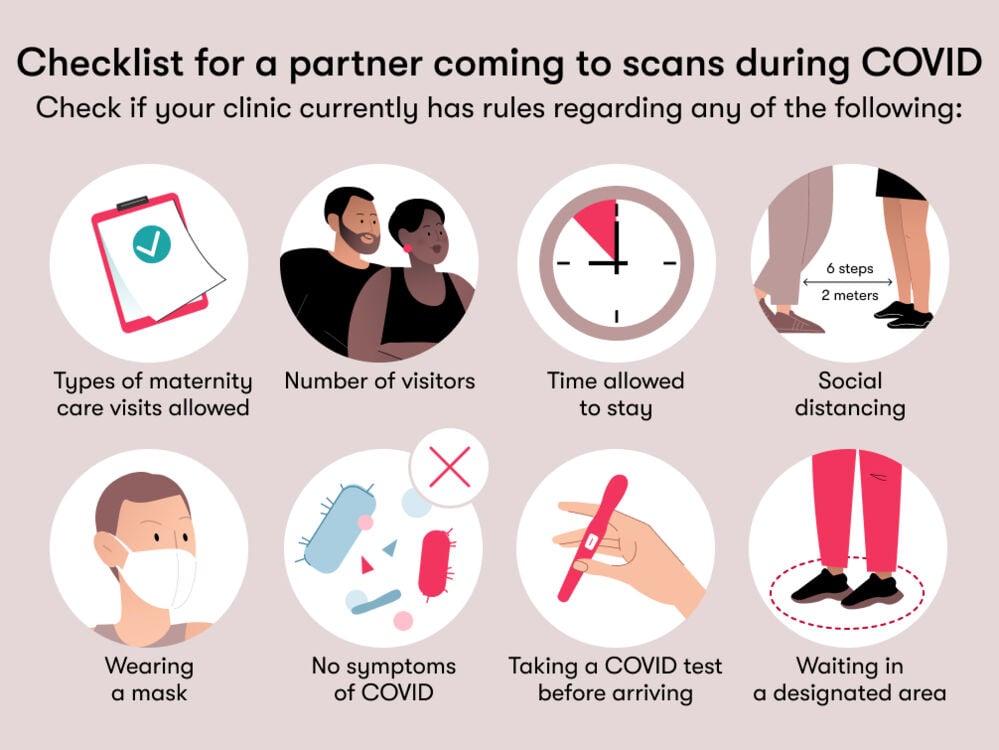Hospital rules around who can attend prenatal scans are changing all the time due to COVID. What’s the latest where you are? Find out here
-
Tracking cycle
-
Getting pregnant
-
Pregnancy
-
Help Center
-
Flo for Partners
-
Anonymous Mode
-
Flo app reviews
-
Flo Premium New
-
Secret Chats New
-
Symptom Checker New
-
Your cycle
-
Health 360°
-
Getting pregnant
-
Pregnancy
-
Being a mom
-
LGBTQ+
-
Quizzes
-
Ovulation calculator
-
hCG calculator
-
Pregnancy test calculator
-
Menstrual cycle calculator
-
Period calculator
-
Implantation calculator
-
Pregnancy weeks to months calculator
-
Pregnancy due date calculator
-
IVF and FET due date calculator
-
Due date calculator by ultrasound
-
Medical Affairs
-
Science & Research
-
Pass It On Project New
-
Privacy Portal
-
Press Center
-
Flo Accuracy
-
Careers
-
Contact Us
Can my partner come to my scan during COVID? Here are the latest rules


Every piece of content at Flo Health adheres to the highest editorial standards for language, style, and medical accuracy. To learn what we do to deliver the best health and lifestyle insights to you, check out our content review principles.
COVID has changed so much of our lives, including the way we access prenatal care. Hospitals have had to rethink everything from the number of birthing partners you can have to who can visit you after you’ve given birth to try to limit the spread of the virus.
If you’re currently pregnant, you might be wondering whether your partner can come to your prenatal scans with you. The answer depends on where you live, but the good news is that the majority of hospitals are doing their best to accommodate partners as long as they follow certain rules.
Let’s look at the current guidelines where you are.
What are the current rules for partners attending scans during COVID?
Hospitals often have their own COVID-specific rules when it comes to allowing partners to attend prenatal checkups like scans. Here’s a general country-specific guide, but we’d recommend checking your clinic’s rules before your scan.
If you live in the US, the American College of Obstetricians and Gynecologists recommends that you call your provider before your appointment to ask if your partner (and/or children) can attend scans with you. At many offices, you are currently able to bring one person along with you, but be sure to double-check.
Currently in the UK, you can have someone with you at all maternity appointments, including seeing the midwife or doctor. Your partner can also join you for scans. You’ll also be offered the chance to buy photos of your dating scans — which take place between weeks 11–14 and 18–20 of pregnancy — to show friends and family or your partner if they can’t make it.
The Australian government currently lets each hospital decide whether to allow partners to come to scans or into the waiting room. Some may strongly prefer that you attend your ultrasound scan alone and do not allow video calling within the scanning room. Those that do allow partners might ask for proof of vaccination or a negative COVID test result when you arrive at the hospital. Again, double-check with your clinic.
Many hospitals around the world are allowing partners to attend scans, as long as they wear a mask and don’t have COVID symptoms. Some may require that they wait outside the building until the appointment so that the waiting room doesn’t get too full.
Wherever you are, good hand hygiene is essential to stopping the spread of COVID. Both you and your partner will need to wash your hands with soap and water for 20 seconds, or use a hand sanitizer containing at least 60% alcohol, when you enter the hospital.
Vaccination also offers another layer of protection against COVID-19. You can get your shot or booster at any time during pregnancy. It is safe and effective. Read our guide to COVID vaccination during pregnancy here.

As we said above, hospital rules around partners attending scans vary from country to country and can change depending on COVID case rates, so it’s always best to call ahead and ask for the latest advice.
How should my partner prepare before coming to a scan?
Your partner should follow the current coronavirus social distancing or quarantine guidelines where you are in the days or weeks leading up to your scan. Check if your provider also has certain requirements for taking a COVID test before joining you in the ultrasound room.
What are the safety measures your partner should follow at a scan?
At the hospital, your partner should:
- Regularly wash their hands with soap and water for 20 seconds or use hand sanitizer with at least 60% alcohol.
- Wear a face mask.
- Maintain a safe distance from others.
- Wait in a designated area or outside, if asked, until called into the exam room.
- Follow any other hospital guidelines around COVID safety.
Take a quiz
Find out what you can do with our Health Assistant
If your partner has symptoms of COVID-19, they will not be able to enter the hospital.
At-home ultrasound scans: Is this a new thing?
There’s been a rise in at-home ultrasounds as the technology has developed, especially during the COVID pandemic, to limit the need for hospital and doctor visits. Expectant parents may purchase or rent an at-home scanner to feel safe, if for instance, a previous pregnancy ended in miscarriage.
To use an at-home ultrasound, you place the device on your belly, and the image shows up on your smartphone through an app or on your laptop via a software program. The images are shared with a health care provider either remotely offline or in real time via teleconsultation. The provider can tell parents whether their baby is growing normally or if next steps are necessary. Some companies rent out the devices, while others offer them for purchase.
However, the British Medical Ultrasound Society and Society of Radiographers do not recommend at-home ultrasound kits and say that ultrasound equipment should only be used by a trained professional. The U.S. Food and Drug Administration also cautions against the use of ultrasound devices by untrained users.
The reasoning for this is that looking at the images with untrained eyes could provide false reassurance that the baby is healthy. Additionally, ultrasound kits that can be purchased cheaply online may not comply with medical standards for devices and may not have undergone necessary testing and quality assurance procedures.
Some services will send a specialist to your home so they can perform the ultrasound there. If you’re not sure about going into the doctor’s office for your ultrasound during the pandemic, speak with your provider about this possibility.
Can my partner come to my scan during COVID? The takeaway
COVID-19 has had an impact on prenatal care visits, and many health care providers have changed the rules about whether partners can attend scans. Be sure to check the current guidance with your doctor’s office and remember that experts don’t recommend purchasing an at-home ultrasound device for your own use.
Most experts agree that 12- and 20-week scans should be performed during pregnancy, regardless of the pandemic or any other related circumstances. These scans should be done by certified medical professionals who specialize in fetal medicine/prenatal ultrasound. They can help to spot any possible issues with your pregnancy or predict future complications. In most cases, your partner will be able to join you for these scans as long as they follow hospital rules and don’t have COVID symptoms.


Hey, I'm Anique
I started using Flo app to track my period and ovulation because we wanted to have a baby.


The Flo app helped me learn about my body and spot ovulation signs during our conception journey.


I vividly
remember the day
that we switched
Flo into
Pregnancy Mode — it was
such a special
moment.
Real stories, real results
Learn how the Flo app became an amazing cheerleader for us on our conception journey.
References
“COVID-19, Gynecologist Visits, and Telehealth: Answers From Ob-Gyns.” Accessed April 29, 2022. https://www.acog.org/womens-health/faqs/coronavirus-covid-19-and-womens-health-care.
“Pregnancy and Coronavirus (COVID-19).” Nhs.uk. Accessed April 29, 2022. https://www.nhs.uk/conditions/coronavirus-covid-19/people-at-higher-risk/pregnancy-and-coronavirus/.
“COVID-19, Gynecologist Visits, and Telehealth: Answers From Ob-Gyns.” Accessed April 29, 2022. https://www.acog.org/womens-health/faqs/coronavirus-covid-19-and-womens-health-care.
CDC. 2022. “COVID-19 Vaccines While Pregnant or Breastfeeding.” Centers for Disease Control and Prevention. April 18, 2022. https://www.cdc.gov/coronavirus/2019-ncov/vaccines/recommendations/pregnancy.html.
“Your Maternity Care and COVID-19.” UC San Diego Health, n.d., https://health.ucsd.edu/coronavirus/Pages/maternity.aspx
“Visitor Guidelines for Patient Care Partners During COVID-19.” Johns Hopkins Medicine, 24 May 2021, https://www.hopkinsmedicine.org/coronavirus/visitor-guidelines.html
“Frequently asked questions about COVID-19 for pregnant women and new parents.” NSW Government Health, 17 May 2021, https://www.health.nsw.gov.au/Infectious/covid-19/communities-of-practice/Pages/guide-pregnant-women-and-new-parents.aspx#partner
“Use of portable ultrasound equipment for at home pregnancy scanning.” The Society of Radiographers, 18 Aug. 2020, https://www.sor.org/news/obstetrics-and-gynaecology/use-of-portable-ultrasound-equipment-for-at-home-p
Kiromitis PgC, Yianni. “Use of Portable Ultrasound Equipment for at Home Pregnancy Scanning.” International Ultrasound Services, 12 Jan. 2021, https://www.iuslondon.co.uk/general-health/use-of-portable-ultrasound-equipment-for-at-home-pregnancy-scanning/
“Ultrasound Imaging.” U.S. Food and Drug Administration, 28 Sept. 2020, www.fda.gov/radiation-emitting-products/medical-imaging/ultrasound-imaging
“Health Care Services to Meet Your Health Care Needs.” Visiting Physicians Association, n.d., https://www.visitingphysicians.com/
Center for Devices and Radiological Health. “Ultrasound Imaging: FDA.” U.S. Food and Drug Administration, FDA, 28 Sept. 2020, www.fda.gov/radiation-emitting-products/medical-imaging/ultrasound-imaging.




